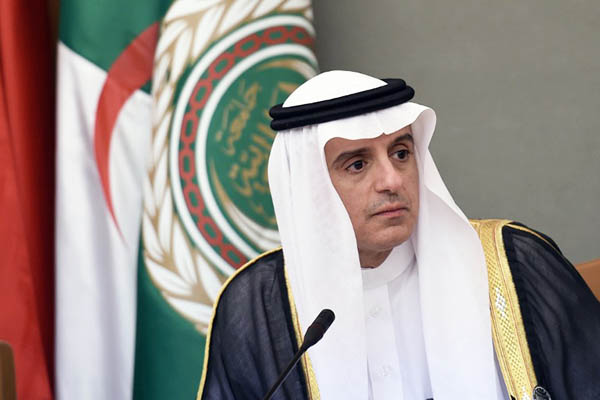
Saudi Foreign Minister Adel al-Jubeir. Fayez Nureldine—AFP
Joint statement demands Doha comply with 13-point list of demands if it wants to end political crisis
The foreign ministers of four Arab states boycotting Qatar said on Sunday they would make no compromises in their demand that Doha change its policies, as a political crisis that has split the Gulf approaches its third month.
Regional kingpin Saudi Arabia, Bahrain, the United Arab Emirates and Egypt broke ties with Qatar on June 5, accusing the emirate of fostering Islamist extremist groups and of ties to Saudi rival Iran. Qatar has denied the allegations.
The foreign ministers of Saudi Arabia, the United Arab Emirates, Bahrain and Egypt, who met in the Bahraini capital on Sunday, said they were open to talks with Qatar on condition it “stops its support and financing of terrorism.”
“We reiterate the importance of Qatar’s compliance with the 13 demands outlined by the four states,” said a joint statement released on Sunday.
The Saudi-led bloc in June issued the list of demands for the lifting of sanctions, including the termination of regional news giant Al-Jazeera, the downgrading of ties to Iran and the closure of a Turkish military base in the country. The four Arab states have recalled their ambassadors from Doha, ordered all Qataris to return home and banned Qatar from using their airspace.
Qatar accuses the bloc of imposing a “blockade” on the tiny emirate and has rejected the demands as a violation of its sovereignty. Qatar has also accused Saudi Arabia of restricting Qatari pilgrimage to Mecca, the site of the annual Hajj pilgrimage that falls next month.
Saudi Arabia and its allies on Sunday accused Qatar of complicating Hajj for its citizens, who cannot take direct flights from Doha to Saudi Arabia under the sanctions.
Kuwait is leading mediation efforts in the crisis, the worst to grip the region since the 1981 creation of the six-nation Gulf Cooperation Council, which includes Saudi Arabia, U.A.E., Bahrain and Qatar. The two other GCC members, Kuwait and Oman, have not joined the Qatar boycott.
